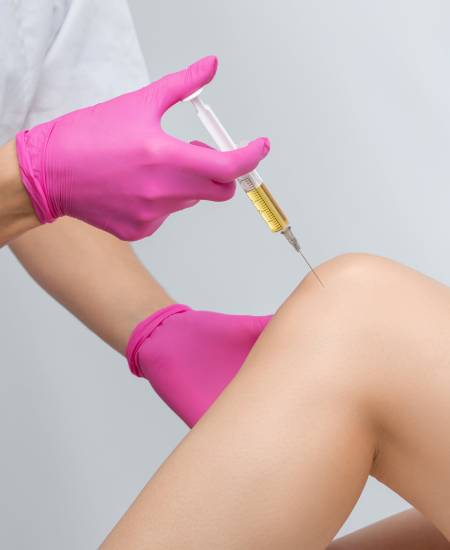



A Regenerative Approach To Managing Pain and Healing Injuries
Effectively managing pain usually requires more than just taking over-the-counter medications. Overcoming injury, chronic pain or disease involves the treatment of the source of the problem, not just its symptoms. With the ground-breaking and evolving field of regenerative medicine, patients can enjoy the success of a therapy that not only alleviates their pain but also targets and heals their injury at the source for long-lasting relief. Body Symmetry MD offers our patients cell therapy —a minimally-invasive treatment that uses specialized human cells to heal damaged tissues naturally.



Every component of your anatomy is made up of cells, from your organs and blood to your bones, skin and hair. There are countless different types of cells in the human body, each having a distinct and designated function that does not change — for example, blood cells will always be blood cells, and bone cells will always be bone cells. Tissue-derived allografts, on the other hand, are special cells that do yet have a specific role in your body. Unlike other cells, tissue-derived allografts possess the remarkable ability to differentiate or transform into many different cell types, meaning that they have the potential to form into any tissue in your body.
By harnessing the power of these blank cells, tissue-derived allografts can be directed into areas of the body damaged by disease or injury to accelerate the healing of these issues. A growing number of researchers and providers in the medical field see endless possibilities for utilizing tissue-derived allografts in regenerative medicine, and Body Symmetry MD is proud to be among one of the first wellness facilities in the area to provide the potential of this promising new field. At our office, we offer our patients mesenchymal tissue-derived allografts injections as a viable solution to a wide range of injuries and ailments.
There are several types of tissue-derived allografts found in the body that form at various stages of your life. You’ve likely heard of or read about embryonic tissue-derived allografts, which are only available at the earliest stages of development and, as their name suggests, are derived from fertilized embryos. Embryonic tissue-derived allografts are incredibly valuable because they can differentiate into every cell type in the body and have countless therapeutic uses for injury and disease. However, there is still a great deal of misinformation and controversy surrounding these tissue-derived allografts because they are taken from a fertilized egg.
A vast majority of embryonic tissue-derived allografts are collected from embryos that develop from donor eggs fertilized in vitro, meaning in a lab. They are not derived from an egg fertilized inside a woman’s body. By directing these lab-grown tissue-derived allografts into specific cell types, tissue-derived allografts may be used to repair many diseases or injuries, including vision and hearing loss, diabetes, heart disease, traumatic spinal injuries and other severe conditions.
Adult tissue-derived allografts, on the other hand, develop during fetal development and remain in your body for the rest of your life. Also called somatic tissue-derived allografts, adult tissue-derived allografts are more specialized than embryonic tissue-derived allografts. Typically, adult tissue-derived allografts are tissue-specific, meaning they can generate different types of cells for the specific tissue or organ when they live.
Mesenchymal tissue-derived allografts, or MSCs, are a type of adult tissue-derived allografts that are multipotent, meaning they can differentiate into more than one type of specialized cell in the body, but not every type. MSCs produce different specialized cells found in skeletal tissue, including bone, cartilage or fat cells. While MSCs have not yet been proven to produce other types of cells outside of skeletal tissues, their abilities continue to be researched. MSCs can be easily isolated and collected from a variety of tissues in the body, like the umbilical cord, bone marrow, adipose tissue (fat), and uterus tissue.
As the field of regenerative medicine evolves and we learn more about the capabilities of MSCs, the clinical applications for tissue-derived allografts continue to expand. Because therapy is a minimally-invasive treatment, there are very few contraindications that would exclude you from this therapy. However, it is essential to have realistic expectations as to what cell therapy can do for you. Cell therapy does not produce immediate results; it could take several weeks to see or feel any improvements, and results vary from patient to patient.
That being said, cell therapy shows great promise for restoring functionality and healing damaged fragile tissues in the body, specifically the muscles, ligaments, joints, and tendons. Cell therapy can help to reduce pain and inflammation, repair existing damage, and delay or prevent surgical intervention. At Body Symmetry MD, we offer cell therapy to treat the following conditions and concerns:
During your initial consultation at Body Symmetry MD, our wellness experts will carefully evaluate your concerns and goals to determine if cell therapy will effectively address your needs.
While the science behind cell therapy is quite complex, the procedure itself is relatively quick and straightforward. MSCs are administered via injection directly into the source of your pain or injury to guide the tissue-derived allografts into your targeted tissues. Over time, the MSCs differentiate and self-renew into cells that match the damaged tissue to accelerate the recovery of the area.
While side effects from cell therapy are rare, you may experience mild redness, bruising or swelling at the site of your injections. These effects will resolve on their own within a few days. Most patients can expect to return to their normal activities as soon as their appointment is over. Downtime may be recommended depending on the nature of your injury or pain; however, this is more for the injury itself than the injections.tissue-derived allografts
Because each patient and their concerns are different, the benefits of cell therapy can vary. Many factors can affect the outcome of your treatment, including your condition, medical history, level of damage, age and more. Some patients may require multiple treatments, but this will depend on your individual response and progress to the therapy. Generally speaking, if a musculoskeletal condition or injury is being addressed, patients will typically observe improvements such as reduced pain or increased functionality about two to six weeks after their treatment.
Cell therapy is a revolutionary new field of medicine that can restore the damage your body has endured by healing tissues naturally from within. If you’d like to discover how cell therapy can be beneficial to you, contact Body Symmetry MD today at 1 (833) 789-2639 or click here to schedule your consultation.
Copyright © 2024 Body Symmetry MD all rights reserved
The content provided on this website is for informational purposes only. It is not a substitute for professional diagnosis, treatment or medical advice. There is no assurance or warranty regarding the accuracy and applicability of the content. Never ignore professional medical advice in seeking treatment because of something you have read on the website. If you think you may have a medical emergency, immediately call your doctor or emergency service.